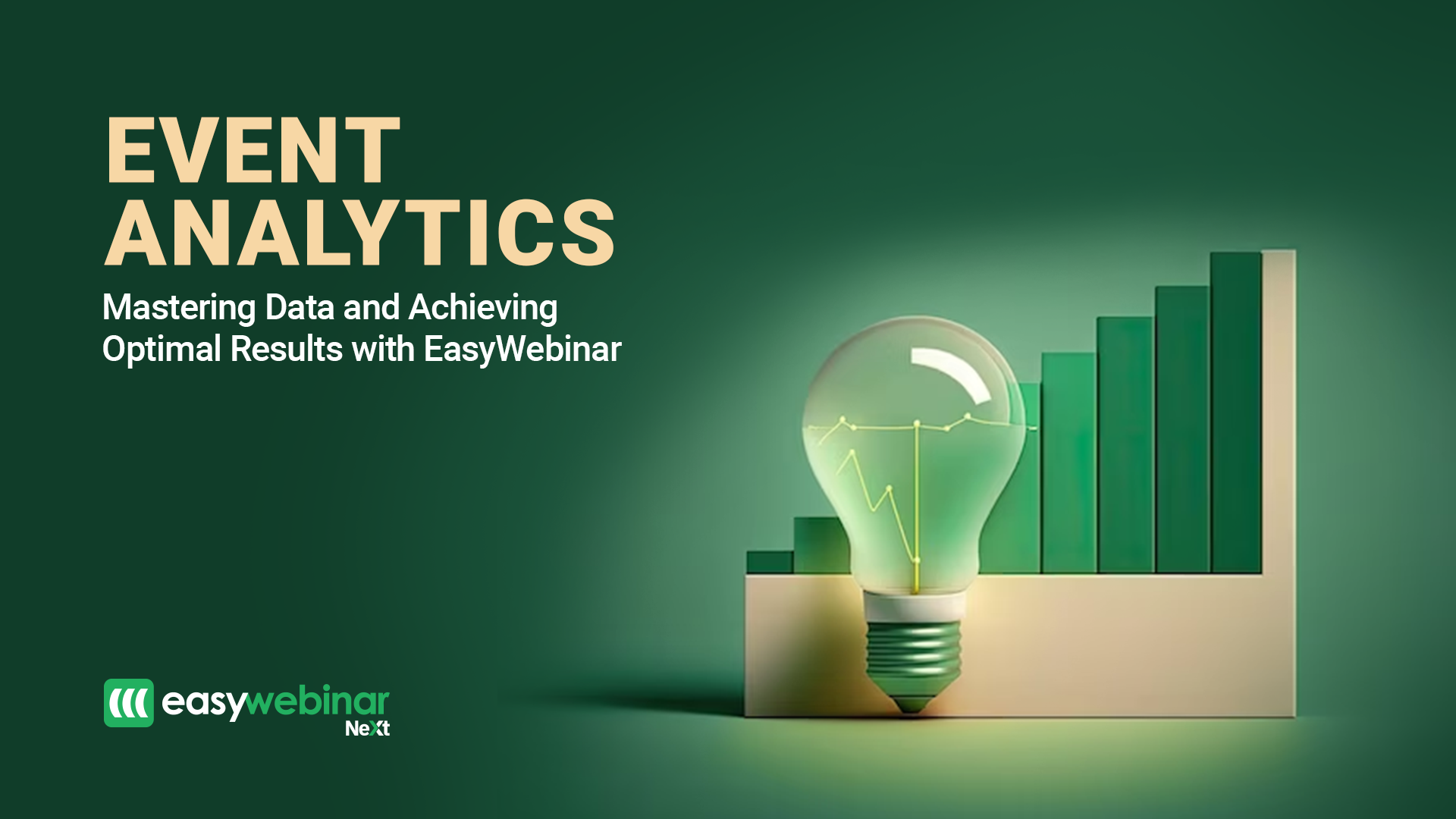Event Analytics: Mastering Data and Achieving Optimal Results with EasyWebinar

In the digital age, hosting virtual events has become increasingly prevalent, offering numerous benefits such as broader reach, cost-effectiveness, and flexibility. One significant advantage of virtual events is the ability to capture detailed analytics and insights.
Organizations can gain valuable information by analyzing event data effectively to enhance future events, improve audience engagement, and achieve optimum results.
In this blog post, we will explore the importance of event analytics and how EasyWebinar, a robust webinar platform, can help you capture and understand critical data for maximizing your event’s success.
I. Understanding the Importance of Event Analytics
A. Defining Event Analytics:
Event analytics refers to collecting, measuring, and interpreting data related to virtual events. It includes metrics such as registration rates, attendee demographics, engagement levels, and attendee feedback.
B. Benefits of Event Analytics:
i. Performance Evaluation: Analytics provides insights into the success of your event, enabling you to assess key performance indicators (KPIs) and identify areas for improvement.
ii. Audience Insights: By analyzing attendee data, you can understand your target audience better, their preferences, and interests, helping you tailor future events to their needs.
iii. ROI Measurement: Event analytics help measure the return on investment (ROI) by analyzing conversion rates, lead generation, and revenue generated.
Suggested: How to Increase ROI & Drive Business Growth
iv. Enhancing Engagement: By analyzing engagement metrics, you can identify engagement gaps and optimize your event strategy to improve attendee participation and satisfaction.
II. Capturing Key Data with EasyWebinar
A. Overview of EasyWebinar:
EasyWebinar is a comprehensive webinar platform designed to simplify hosting virtual events. It offers robust features for capturing and analyzing event data.
B. Registration and Attendance Data:
EasyWebinar provides detailed registration data, including the number of registrations, conversion rates, and traffic sources, enabling you to gauge the success of your promotional efforts.
The platform also tracks attendance rates, allowing you to assess audience interest and identify factors influencing attendee drop-offs.
C. Engagement Metrics:
EasyWebinar offers real-time engagement analytics, providing insights into attendee participation, stay duration, and event interaction levels.
You can track engagement features such as chat messages, poll responses, and Q&A interactions to gauge attendee involvement and identify popular topics.
D. Polling and Surveys:
EasyWebinar enables you to conduct polls and surveys during the event, capturing valuable feedback and preferences from attendees.
Analyzing poll and survey data helps you understand audience opinions, gather insights, and tailor future events accordingly.
E. Integration with CRM Systems:
EasyWebinar seamlessly integrates with popular Customer Relationship Management (CRM) systems, allowing you to track attendee behavior, segment your audience, and nurture leads.
By combining event data with CRM data, you can comprehensively understand attendee engagement before, during, and after the event.
III. Utilizing Event Analytics for Optimum Results
A. Data Interpretation and Visualization:
Once you have captured event data through EasyWebinar, it is essential to analyze and interpret the information effectively.
Visualizing data through charts, graphs, and reports helps identify patterns, trends, and improvement areas.
B. Identifying Success Metrics:
Define success metrics specific to your event goals, such as lead generation, attendee satisfaction, or conversions.
Analyze relevant data to measure success and determine if you have achieved your desired outcomes.
C. Continuous Improvement:
Use event analytics to identify areas for improvement and refine your event strategy.
To make data-driven decisions, focus on metrics that provide actionable insights, such as attendance, engagement, and conversion rates.
D. Audience Segmentation:
Leverage the data captured through EasyWebinar to segment your audience based on demographics, engagement levels, or interests.
Tailor future events to different audience segments to enhance engagement and meet their needs.
E. Feedback and Testimonials:
Analyze attendee feedback and testimonials to gain insights into attendee satisfaction, event impact, and areas requiring improvement.
Incorporate feedback into your future event planning to enhance the attendee experience.
F. Iterative Approach:
Use event analytics to iterate and refine your event strategy continuously.
Regularly assess your performance, make data-driven adjustments, and experiment with different approaches to optimize your results.
Conclusion :
Analyzing event analytics is crucial for virtual events. With EasyWebinar’s suite of features, organizers capture and understand critical data effectively, gaining valuable insights to enhance future events and achieve optimum results.
Continuously improve your event strategy based on analytics, unlock the full potential of virtual events, and drive meaningful engagement with your audience.
Try EasyWebinar with 14-days free trial.